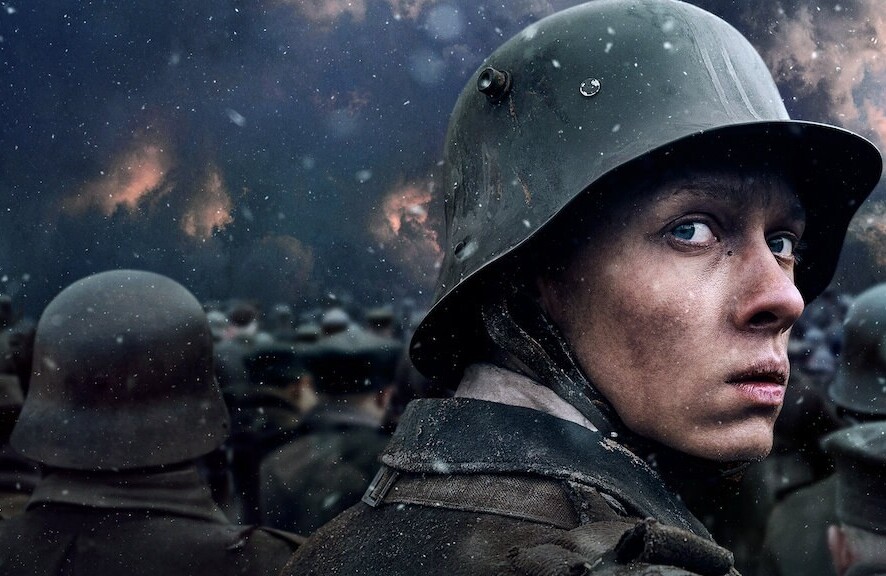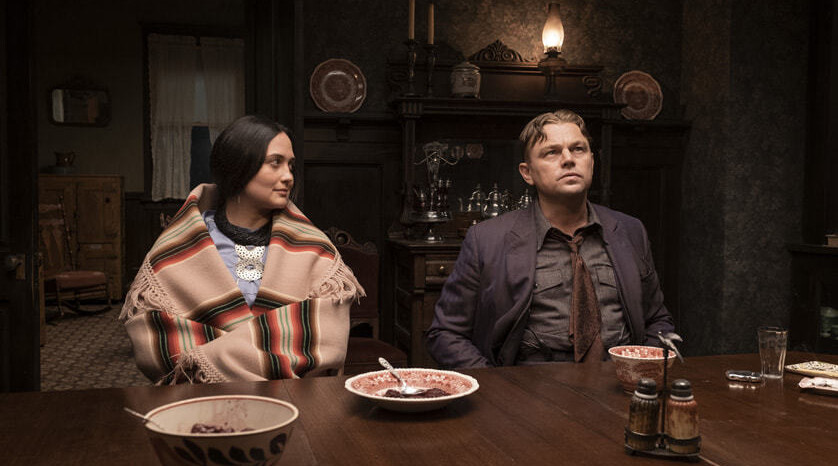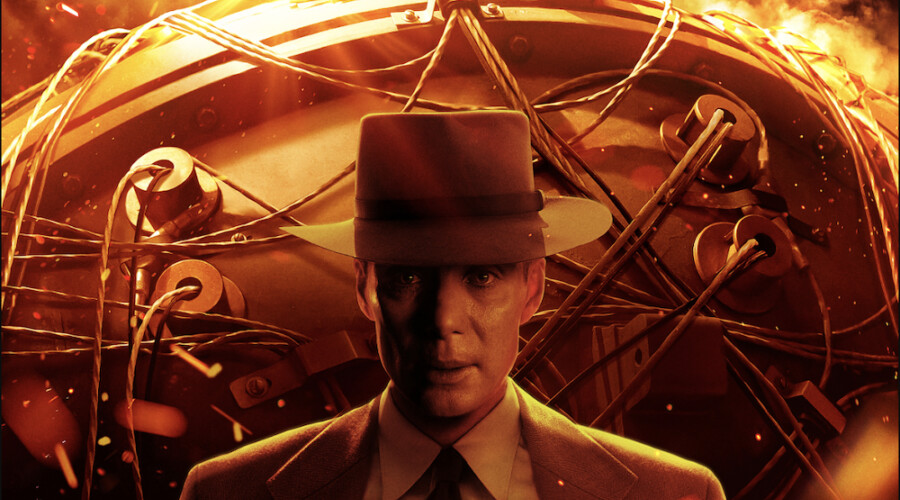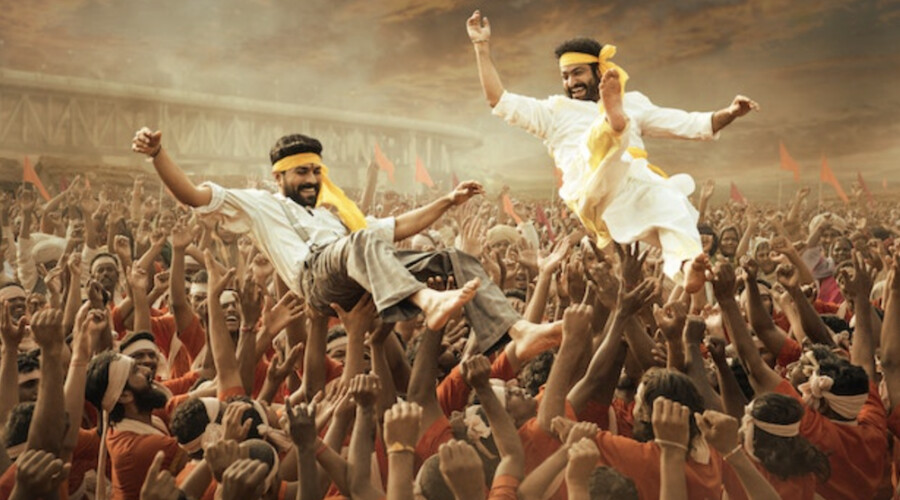For nearly 100 years, All Quiet on the Western Front has been hailed as an "anti-war" classic. Erich Maria Remarque's 1929 novel and then the 1930 film directed by Lewis Milestone have been praised for their realism, taught in schools all over the world, and, with Edward Berger’s 2022 German-language Oscar-winning remake, the story now has a home on Netflix. And as headlines about "World War III" proliferate—one specific fear at the moment of publication is China arming Russia in its war against Ukraine—it’s a cliché to say the story is "more relevant than ever."
Still, that is undoubtedly the truth. Just 13 months ago, an informed observer could make the case that Europe—or even the whole world—had moved beyond the era of interstate conflict and trench battles; or that the next war would be slickly fought with new technology, with most of the damage contained to cyberspace. But looking at the destruction in Ukraine makes it clear that war is just as hellish, irrational, and dirty as it was over a century ago.
Synopsis
In All Quiet, the viewer sees World War I mostly through the lens of Paul Bäumer (Felix Kammerer), a mild-mannered 17-year-old middle class student from Northern Germany who forges his father's signature at the urging of his friends to join the war effort. Spurred on by a rousing speech from his school's headmaster, Bäumer and his classmates can't wait to get to "Paris," seemingly oblivious to the fact that the war has been stalled for years in the French countryside and young men and boys have been dying by the millions. A parallel plot showing the deliberations of German politicians and military commanders, though, makes it clear that the government knew exactly how badly the war was going.
Still, Bäumer and his friends are thrown straight into the muddy, disease-ridden trenches and within hours, all the fantasies about glory and Paris break down. Their camp is bombed on the first night and the next morning Bäumer has to retrieve his friend's identification tag, the teenager lying dead face down in the mud.
From there, the movie fast-forwards 18 months and Bäumer has become a hardened soldier. The German and French officials continue to haggle over literal kilometers and launch a series of pointless battles. As Bäumer watches his friends die one by one—each in a more heartbreaking fashion than the next—he moves further and further away from that easygoing 17-year-old. By the end, as Bäumer fights in a trench minutes before the armistice becomes official, it’s clear that there are no winners and that seeds have been planted for, somehow, an even more deadly war.
Subscribe to the Carnegie Ethics Newsletter for more Ethics on Film reviews
Looking at Ukraine
Watching this film in 2023, many viewers' thoughts will immediately turn to Ukraine. The first part of All Quiet could be about Russia's invasion, with very little to change, other than the language and the style of clothes. In both cases, teenagers are sold lies and propaganda by adults about the glory and excitement of the battlefield, the righteousness of their cause, and the ease by which they'll defeat the enemy. But on the frontlines, they’re fighting against people who look just like them, they're stuck in trenches for weeks or months, and the actual military goals are unknown to the soldier, and maybe even most of the commanders. It's impossible to overstate the futility of the tactics in World War I—years and years of trench warfare, with millions dead, for a frontline that barely moved. The war in Ukraine is far from that scale and it remains to be seen what the end result will be, but with hundreds of thousands dead and no end to this conflict in sight, it's already one of the great tragedies of this or any other century.
The trickier part, though, especially for those of us in the United States or other Western countries, is looking at our own feelings about the war in Ukraine. Joe Biden and other leaders have given speeches discussing the existential stakes at play, Volodymyr Zelenksyy has been lionized as a new Churchill, and mercenaries have poured in from throughout the world to fight alongside the Ukrainians. Like Paul Bäumer and his friends, many of the people writing and thinking about this war have no understanding of what battle is like. It's easy to call for more tanks and anti-aircraft missiles when there’s no chance that your home could get destroyed.
The lofty speeches and think pieces about the historical dimension of the war don’t change the fact that, on the ground, (mostly young) people are getting killed, innocent lives are being destroyed, and towns are being wiped off the map. All Quiet telegraphs the point that even ending a war a day, an hour, a minute earlier is a life-or-death decision for thousands. For anyone, on either side, who is making decisions about war without risking their own life, finding a way to end the conflict should be the first thing on their mind when they wake up every day.
The View from Germany
Beyond the parallels to Ukraine, for most Americans, this version of All Quiet has perhaps been a reminder of an assigned reading in high school or college or, if they've watched it, one of the many violent dramas that audiences here are used to, this one a little more heart-wrenching and historical. In Germany, though, judging by the headlines, it's been a source of controversy ever since it was released, even more so now in awards season.
The World Wars are, of course, viewed quite differently in Germany than in the U.S. and most of Western Europe and Remarque's novel seems to represent an almost public act of repentance for Germans living after the wars, deeply ashamed of their nation’s history. The book could be seen along with laws against anti-Semitism and Holocaust denial as a bulwark against the militarization and extremism that defined the first half of the 20th century in Germany.
It should then be no surprise that turning All Quiet into a slickly packaged Netflix war epic, with scenes cut and changed—and the negotiations between the French and German officials added in—would offend many in the nation. Adding to this tension is the fact that we undeniably “side” with the German soldiers. Throughout the film, they’re the plucky underdogs. We see them cry, bond over their families, and we even root for them to steal a goose from a local farmhouse. During the battle scenes, the audience is forced to emphasize with these young men, visibly frightened and undermanned and fighting off tanks and flamethrowers.
This all makes for a compelling story, but it understandably makes some feel uncomfortable. A phrase that comes up often in German articles about the film is that it is, put politely, "Oscar bait"—selling out an important historical artifact to an American audience, company, and award show for prestige and entertainment. As the film critic at Germany newspaper Bild writes: "[The 2022 version] . . . is a piece of indescribable impudence. It takes a considerable portion of ignorance, disrespect and Oscar-lust to mess up a masterpiece in such a fashion, to pulverise its content and story so mercilessly." Now, with four Oscar wins, including one for Best International Feature, this debate is sure to continue.
"Be fair to your enemy"
Beyond the horrors of the battlefield, the film also attempts to illustrate the complexities and sensitivities of how wars end. When it's clear which side has lost, a German official (Daniel Brühl) says to his French counterpart (Thibault de Montalembert), critical of his side's many conditions to end the war, "Be fair to your enemy, otherwise he will hate the peace." Just a few years later Adolf Hitler and the Nazis would rise to power, leading to an even deadlier and more global war.
There are many arguments and countless books written about whether there's a straight line from the Treaty of Versailles in 1919 to the invasion of Poland in 1939, but that debate is beyond the scope of the film or this review. What All Quiet makes clear, though, is that the world of the military commanders and politicians are much too far removed from the world of the soldier. The film loves to show the contrast between the muddiness of the trench and the ornate stylings of the officials’ rail cars and offices, or the tattered clothes of the soldiers against the perfectly coiffed and mustachioed commanders.
It goes much deeper than clothes and furniture, however. As the commanders haggle in one scene about the cost of the war, Brühl’s politician makes the point that his son recently died in battle. This darkens the mood for a minute but doesn't change the negotiations in any meaningful way. And the two sides keep fighting right up until the armistice begins "on the 11th hour, of the 11th day, of the 11th month." For all its flaws, the film ends with a truly dark reminder of how horrific war is and who makes the greatest sacrifice.
Discussion Questions
- Does the new film fulfill the message of 1929 novel, the 1930 film, or its legacy as an "anti-war" classic?
- Is it ethically wrong to repackage this novel for Netflix and for awards show recognition?
- Is it wrong to relate to German soldiers in this film, knowing that their nation launched a war of aggression? Is it possible to separate the act of a soldier from the goals of their military or government?
- How should leaders talk about war to their citizens? Is propaganda ever necessary?
- What should be the age limit for soldiers to enter war? Is it always ethically wrong for teenagers to fight in wars?
- How should wars end? Is there an obligation to "be fair to your enemy"?
- Is war always glorified when it's presented as a big budget film? How can you responsibly make a war movie?
Works Cited
"An antiwar epic became an awards darling. Why Germans don’t see it quite the same way," Los Angeles Times, Mark Olsen, 2023
"Of War and Capitalism: The Debate About All Quiet on the Western Front Goes All the Way Back to the Book," Literary Hub, Bruce Krajewski, 2023
"Germans are right to be incensed by All Quiet on the Western Front: it paints them as the good guys," The Guardian, Nicholas Barber, 2023
"Germans Are Right to Hate All Quiet on the Western Front," Slate, Rebecca Schuman, 2023
"German critics pan Oscar-nominated All Quiet On the Western Front," The Guardian, Philip Oltermann, 2023
Carnegie Council for Ethics in International Affairs is an independent and nonpartisan nonprofit. The views expressed within this article are those of the author and do not necessarily reflect the position of Carnegie Council.




